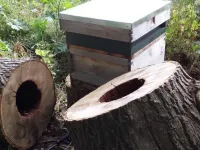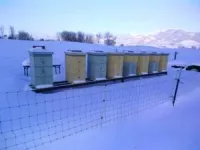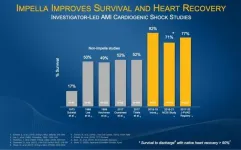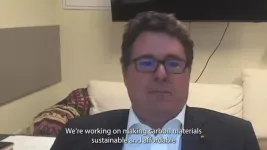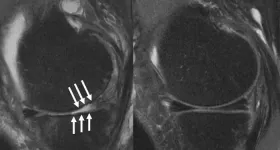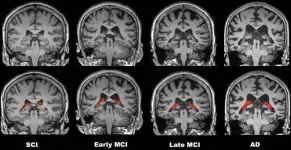*See further information at end of release for captions and required pic credits
A Leeds researcher is keen to help beekeepers shape their practices following his study which appears to disprove the widespread belief that honeybees naturally insulate their colonies against the cold. His findings suggest that the creatures are potentially being subjected to thermally-induced stress.
University of Leeds PhD student Derek Mitchell is calling for further debate on the ethical treatment of insects, saying his research appears to contradict the widely-accepted theory that the bees’ reaction to cold temperatures is to form layers of insulation – an idea that has led to them being housed in hives that are extremely poorly insulated compared to their natural habitat.
The study, which is published in the Journal of the Royal Society Interface, looks at honeybee “clusters” - where the insects huddle together, forming dense disks between the combs, to try to keep some of them above 18°C when the outside temperature drops. For almost 120 years, the outer layer of honeybees in the winter cluster – known as the mantle - has been said to insulate the cluster core – the honeybees at the centre.
Adopting the same techniques used for measuring heat loss from buildings, Mr Mitchell - from the School of Mechanical Engineering - analysed this theory. However, his findings indicate that far from acting as insulation, the mantle instead acts like a heat sink – dissipating the heat away from the centre. The paper states: “The cluster mantle does not meet any the four insulation criteria identified and meets all three heat sink criteria.”
Mr Mitchell said: “My findings are controversial because it has become a tenet of beekeeping - that the mantle insulates the honeybees.”
He explains that once the outside temperature falls, the heat needed to sustain 18°C+ inside goes up. If the bees cannot produce that much heat, the temperature near the hive wall drops and the honeybees near it become chilled and they move closer to bees that can still efficiently produce heat. They get closer together and their combined thermal conductivity increases, which further increases the heat loss.
He said: “This new research indicates that, rather than being benign, clustering is a survival behaviour in response to an existential threat - resulting in increased stress due to cold and exertion. Some honeybees may even eat their own young to survive.”
He added: “In anthropomorphic terms, clustering is not a “wrapping of a thick blanket” to keep warm - but more like a desperate struggle to crowd closer to the “fire” or otherwise die.”
He said: “I want to share my research, to raise awareness of the welfare issues and to help educate beekeepers about the complex interaction of the colony enclosure and thermofluids - heat, radiation, water vapour, air - with honeybee behaviour and physiology.”
Harvey M. Thompson, Professor of Computational Fluid Dynamics at the University of Leeds, who supervised the new research, said: “It’s great to see how mechanical engineering can be applied to such a variety of fields and how these findings can potentially be used to help beekeepers in the future.”
Mr Mitchell’s research came about when his wife took up beekeeping and he noticed that people still used hives designed in the 1930s and 1940s.
He said: “The hives beekeepers used were at odds with what I knew about heat transfer and what beekeepers had told me about honeybees. I thought I could build better hives, so started out trying to find the requirements of the honeybees and found out that nobody knew in terms that made engineering sense.”
After studying mechanical engineering as a student apprentice, he returned to the subject as a PhD student. Using engineering techniques more commonly used to solve industrial problems, his previous research suggested that most manufactured hives have seven times more heat loss than natural nests.
Mr Mitchell, who also has a Physics BSc, Microelectronics MSc and worked in spacecraft ground control software, said he believed misconceptions around clustering had, in part, arisen because the creatures’ overwintering behaviour was dominated by observations in thin (19mm) wooden hives, with very different thermal properties to their natural habitat of thick walled (150mm) tree hollows.
He said those long-held beliefs have encouraged enforced clustering, by beekeepers’ dominant use of what he labels “inadequately insulated hives” and, in North America, refrigeration. This is often seen as a benign or even a necessary process, with beekeeping and academic research considering these conditions of extreme heat loss as natural and normal.
He is calling for changes in practice to be urgently considered, researched and promoted, as well as further debate on the ethical treatment of honeybees and insects.
Research paper: Honeybee cluster—not insulation but stressful heat sink is being published in the Journal of the Royal Society Interface at 00.01 GMT on November 22, 2023. When the embargo lifts, the paper will be available on the journal website: https://doi.org/10.1098/rsif.2023.0488
ENDS
END
Honeybee cluster—not insulation but stressful heat sink
2023-11-27
(Press-News.org) With images - the visual assets can be downloaded by clicking on this WeTransfer link:https://we.tl/t-mbRtSW5BzO
ELSE PRESS RELEASES FROM THIS DATE:
Smog from Copenhagen’s Bispeengbuen heads straight into living rooms
2023-11-27
A large amount of the heavy automobile pollution from Copenhagen’s Bispeengbuen thoroughfare goes straight into people's homes. This, according to a study by researchers at the University of Copenhagen. A sensor developed by one of the researchers can help fill in the blanks of our understanding about local air pollution.
Air pollution cuts the lives of more than four thousand Danes short every year. Locally, we have a very limited understanding how many harmful substances waft in the air we breath. Indeed, air pollution is only monitored at fourteen locations across Denmark.
This ...
Most unmarried, low-income couples show positive co-parenting
2023-11-27
COLUMBUS, Ohio – Despite the many challenges they face, slightly more than half of unmarried low-income couples with children have positive co-parenting relationships, a new study found.
And those supportive relationships were linked to their children showing more empathy, less emotional insecurity and fewer behavior problems.
Parents who are good co-parents work together as a team, provide support to each other and back up each other’s parenting decisions, said Susan Yoon, lead author of the study and associate professor of social work at The Ohio State University.
Those types of relationships may be particularly hard for the parents in this study, ...
Mount Sinai researchers find testosterone hormone therapy for transmasculine individuals is safer than previously thought
2023-11-27
A common concern about gender-affirming hormone therapy for transmasculine people is the risk of red blood cell volume changes and erythrocytosis, a high concentration of red blood cells, with the use of prescribed testosterone. However, Mount Sinai researchers have found that testosterone treatment may be safer than previously reported, with results published today in The Journal of Clinical Endocrinology and Metabolism.
Mount Sinai researchers from the Division of Endocrinology and Center for Transgender Medicine and Surgery examined the relationship between the use of testosterone as part ...
Making a difference, belonging drives rural festival volunteers and bolsters community development
2023-11-27
AMES, Iowa — During Orange City’s three-day tulip festival each May, the northwest Iowa town attracts roughly 40,000 visitors, more than six times its population. People come for the blooms and parades, traditional Dutch food and musical theater. For the community, it’s an opportunity to celebrate its cultural heritage and give a boost to local businesses.
Volunteers are essential to the festival’s success, as they are for many rural celebrations across the Midwest. But not a lot of research has examined their motivations. To help fill this gap, researchers surveyed hundreds of volunteers from 12 festivals — including ...
First patient enrolled in Abiomed’s RECOVER IV randomized controlled trial of Impella as a therapy for AMI cardiogenic shock
2023-11-27
DANVERS, Mass. – Nov. 27, 2023 – Abiomed, part of Johnson & Johnson MedTech[1], announces the first patient in the world has been enrolled in the landmark RECOVER IV randomized controlled trial (RCT). The on-label, two-arm trial will randomize 548 patients to assess whether Impella support prior to percutaneous coronary intervention (PCI) is superior to PCI without Impella in patients with acute myocardial infarction (AMI) cardiogenic shock.
Impella is the only mechanical circulatory support device for the treatment of AMI cardiogenic ...
Kavli Exploration Award backs Rice-led sustainable carbon materials research
2023-11-27
HOUSTON – (Nov. 27, 2023) – An international team of scientists led by Rice University’s Matteo Pasquali has won a $4.1 million grant to optimize carbon nanotube synthesis, a process that could help drive the green energy transition by providing more sustainable alternatives to materials dependent on heavy industry. The award is a joint effort by The Kavli Foundation, with a $1.9 million Kavli Exploration Award in Nanoscience for Sustainability, and Rice’s Carbon Hub, which contributed an additional $2.2 million.
“The energy transition is primarily a material transition,” Pasquali said. “Renewable energy ...
Mixing heat with hair styling products may be bad for your health
2023-11-27
Hair products often contain ingredients that easily evaporate, so users may inhale some of these chemicals, potentially posing health repercussions. Now, researchers have studied emissions of these volatile organic compounds (VOCs), including siloxanes, which shine and smooth hair. The scientists report in ACS’ Environmental Science & Technology that using these hair care products can change indoor air composition quickly, and common heat styling techniques — straightening and curling — increase VOC levels even more.
Some ...
Stronger thigh muscles may prevent knee replacement surgery
2023-11-27
CHICAGO – Stronger quadriceps muscles, relative to the hamstrings, may lower the risk of total knee replacement, according to research being presented today at the annual meeting of the Radiological Society of North America (RSNA). Researchers said the findings could inform strength-training programs for people with advanced arthritis in the knee.
Advanced knee osteoarthritis is a major cause of pain and disability worldwide. In the U.S. alone, 14 million adults have symptomatic knee osteoarthritis, and more than half of those diagnosed are projected to eventually undergo total knee replacement surgery.
While stronger muscle groups are generally understood ...
Black patients face delays in Alzheimer’s diagnosis
2023-11-27
CHICAGO – Black patients underwent medical imaging for cognitive impairment years later than white and Hispanic patients and were less frequently tested with MRI, according to research being presented this week at the annual meeting of the Radiological Society of North America (RSNA).
Previous studies have shown that Black patients are at increased risk of Alzheimer’s disease and other types of dementia. They are less likely to have a diagnosis and are diagnosed at a more advanced stage of disease compared to white patients.
Medical ...
Patient support programs for prescription drugs are common, especially for expensive drugs
2023-11-27
About 1 in 10 prescription drugs — mainly brand-name and expensive drugs and those for rare diseases — has a manufacturer-sponsored patient support program, which usually includes financial, nursing and educational supports.
"In an era where policy-makers are grappling with escalating drug prices and budgetary impacts globally, the pharmaceutical industry promotes patient support programs as adding complementary value to a drug through supporting medication adherence and enhancing clinical outcomes, patient experience or quality of life," ...
